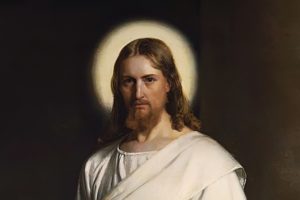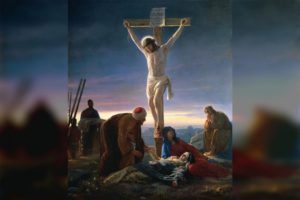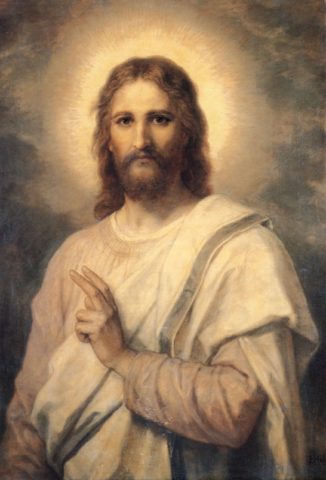The Bible’s Answer
In Deuteronomy 18, the Prophet Moses made a significant prophecy about God raising up a Prophet like himself:
The LORD your God will raise up for you a prophet like me from among you, from your brothers—it is to him you shall listen— 16 just as you desired of the LORD your God at Horeb on the day of the assembly, when you said, ‘Let me not hear again the voice of the LORD my God or see this great fire any more, lest I die.’ 17 And the LORD said to me, ‘They are right in what they have spoken. 18 I will raise up for them a prophet like you from among their brothers. And I will put my words in his mouth, and he shall speak to them all that I command him. 19 And whoever will not listen to my words that he shall speak in my name, I myself will require it of him. (Deuteronomy 18:15–19, ESV-UK)
We are told that the Prophet will be from among Moses’ brothers, that he must be listened to, will be like Moses, speak God’s words and all that God commands him, and that Israel must listen to him or else receive punishment. While numerous prophets of the Old Testament were similar to Moses in various ways, none of them perfectly fulfills this prophecy except for the Lord Jesus Christ.
Apostolic Teaching
The Apostle Peter taught that this prophecy finds its fulfilment in Jesus, when addressing the Jews in Solomon’s Portico:
Repent therefore, and turn again, that your sins may be blotted out, 20 that times of refreshing may come from the presence of the Lord, and that he may send the Christ appointed for you, Jesus, 21 whom heaven must receive until the time for restoring all the things about which God spoke by the mouth of his holy prophets long ago. 22 Moses said, ‘The Lord God will raise up for you a prophet like me from your brothers. You shall listen to him in whatever he tells you. 23 And it shall be that every soul who does not listen to that prophet shall be destroyed from the people.’ 24 And all the prophets who have spoken, from Samuel and those who came after him, also proclaimed these days. 25 You are the sons of the prophets and of the covenant that God made with your fathers, saying to Abraham, ‘And in your offspring shall all the families of the earth be blessed.’ 26 God, having raised up his servant, sent him to you first, to bless you by turning every one of you from your wickedness.” (Acts 3:19–26)
As Peter said, the ultimate fulfilment of Deuteronomy 18:15–19 is that Jesus, the Messiah, blesses all believers in him by turning them from their wickedness, and granting them the forgiveness of all their sins. Below, we will discuss more evidence which points to Jesus being this Prophet.
Jesus Is from Among Moses’ Brothers
The first requirement of the Prophet is that he must be from among Moses’ brothers, the Israelites. This refers to the descendants of Jacob, who was renamed Israel (Ex 1:1–7), the son of Isaac, and grandson of Abraham, also known as the Hebrews (Ex 3:18). The biblical and historical witness show that Jesus was indeed an Israelite, of the tribe of Judah:
Philip found Nathanael and said to him, “We have found him of whom Moses in the Law and also the prophets wrote, Jesus of Nazareth, the son of Joseph.” (John 1:45)
The book of the genealogy of Jesus Christ, the son of David, the son of Abraham. 2 Abraham was the father of Isaac, and Isaac the father of Jacob, and Jacob the father of Judah and his brothers, … 16 and Jacob the father of Joseph the husband of Mary, of whom Jesus was born, who is called Christ. (Matthew 1:1–2, 16)
But as he considered these things, behold, an angel of the Lord appeared to him in a dream, saying, “Joseph, son of David, do not fear to take Mary as your wife, for that which is conceived in her is from the Holy Spirit. 21 She will bear a son, and you shall call his name Jesus, for he will save his people from their sins.” (Matthew 1:20–21)
And one of the elders said to me, “Weep no more; behold, the Lion of the tribe of Judah, the Root of David, has conquered, so that he can open the scroll and its seven seals.” (Revelation 5:5)
Being a descendant of King David, Jesus is the rightful heir to his throne, and has been appointed by the Father to rule upon that throne forever (Is 9:6–7; Heb 1:8) and to be the Spirit-anointed Messiah (Is 61:1), the Saviour of the world (Is 53:11; Ac 2:36; 1Jn 4:14). For, as Jesus said, “salvation is from the Jews” (Jn 4:22).
Jesus Is to Be Listened to
The second requirement is that the Prophet is to be listened to. It’s true that God has always expected his people to listen to his prophets. However, God gave his disciples a special command to listen to Jesus Christ, who is his Beloved Son, his Chosen One, with whom he is well pleased. The Father made this magnificent declaration during Jesus’ transfiguration, in a way that is reminiscent of Jesus’ baptism:
He was still speaking when, behold, a bright cloud overshadowed them, and a voice from the cloud said, “This is my beloved Son, with whom I am well pleased; listen to him.” 6 When the disciples heard this, they fell on their faces and were terrified. 7 But Jesus came and touched them, saying, “Rise, and have no fear.” 8 And when they lifted up their eyes, they saw no one but Jesus only. (Matthew 17:5–8)
And a cloud overshadowed them, and a voice came out of the cloud, “This is my beloved Son; listen to him.” (Mark 9:7)
And a voice came out of the cloud, saying, “This is my Son, my Chosen One; listen to him!” (Luke 9:35)
There’s no doubt that by setting Jesus apart as unique and special amongst the prophets, coupled with the command to listen to him, that the Father was identifying Jesus as the Prophet of Deuteronomy 18:15.
Jesus Is Like Moses
The third requirement is that the Prophet must be like Moses. What constitutes being “like Moses”, though? The answer lies in Moses’ relationship with God, because this was what distinguished him from every other Old Testament prophet. The author who finished the book of Deuteronomy after Moses’ death wrote: “And there has not arisen a prophet since in Israel like Moses, whom the LORD knew face to face” (Deut 34:10). Moses was unique amongst Old Testament prophets, because he regularly spoke with and saw God in the Tent of Meeting, where he would receive his laws to deliver to the people. We read:
When Moses entered the tent, the pillar of cloud would descend and stand at the entrance of the tent, and the LORD would speak with Moses. 10 And when all the people saw the pillar of cloud standing at the entrance of the tent, all the people would rise up and worship, each at his tent door. 11 Thus the LORD used to speak to Moses face to face, as a man speaks to his friend. (Exodus 33:9–11)
Indeed, as Deuteronomy says, since Moses no other prophet has arisen like this. That is, until Jesus came. Remarkably, the Apostle John wrote concerning Jesus:
For the law was given through Moses; grace and truth came through Jesus Christ. 18 No one has ever seen God; the only God, who is at the Father’s side, he has made him known. (John 1:17–18)
It is written in the Prophets, ‘And they will all be taught by God.’ Everyone who has heard and learned from the Father comes to me— 46 not that anyone has seen the Father except he who is from God; he has seen the Father. (John 6:45–46)
Jesus said to them, “If God were your Father, you would love me, for I came from God and I am here. I came not of my own accord, but he sent me. (John 8:42)
Although Moses spoke with God face to face, he only saw God the Father’s majesty and glory behind a cloud (Ex 33:9–11). Jesus Christ, on the other hand, the one who is from God, has seen the fullness of the Father. Though God regularly met with Moses in the Tent of Meeting, Jesus and the Father have always been in perpetual communion with each other (Jn 8:29), even before Jesus came to the Earth (Jn 1:1, 14), dwelt (and still dwell) within each other (Jn 14:10), and are one being (Jn 10:30–33), as the Trinity teaches.
As a prophet, Moses could reveal God based upon his limited knowledge. As the only Son of the Father in human flesh (Jn 1:14), only Jesus can fully reveal God to fellow humans, as he himself said: “no one knows the Son except the Father, and no one knows the Father except the Son and anyone to whom the Son chooses to reveal him” (Mat 11:27; see also Jn 5:19–20; Col 1:15). Moses’ face shone with God’s glory, after he saw God descend on Mount Sinai in a cloud (Ex 34:5), but had to hide his face under a veil before the Israelites (2Cor 3:7, 12–13; Ex 34:34–35). But Jesus’ face shines unhidden with the fullness of the glory of God (2Cor 4:4, 6), which Christians behold with unveiled faces (2Cor 3:18). So, Jesus is indeed like Moses, but greater, as we would expect from fulfilled prophecies.
Jesus Speaks God’s Words
The fourth requirement is that God puts his words in the Prophet’s mouth and that the Prophet must speak all that God commands him. A brief survey of John’s Gospel shows us that Jesus without a doubt fulfills this:
For he whom God has sent utters the words of God, for he gives the Spirit without measure. (John 3:34)
So Jesus answered them, “My teaching is not mine, but his who sent me. (John 7:16)
I have much to say about you and much to judge, but he who sent me is true, and I declare to the world what I have heard from him.” (John 8:26)
So Jesus said to them, “When you have lifted up the Son of Man, then you will know that I am he, and that I do nothing on my own authority, but speak just as the Father taught me. (John 8:28)
Which one of you convicts me of sin? If I tell the truth, why do you not believe me? 47 Whoever is of God hears the words of God. The reason why you do not hear them is that you are not of God.” (John 8:46–47)
Whoever does not love me does not keep my words. And the word that you hear is not mine but the Father’s who sent me. (John 14:24)
No longer do I call you servants, for the servant does not know what his master is doing; but I have called you friends, for all that I have heard from my Father I have made known to you. (John 15:15)
For I have given them the words that you gave me, and they have received them and have come to know in truth that I came from you; and they have believed that you sent me. (John 17:8)
Because Jesus is the Father’s only Son, bound together with him inseparably in essence (being) and love, Jesus can only say, judge, and do whatever the Father shows him (Jn 5:18–21, 30). One other account worth bringing up is Jesus’ conversation with the Samaritan woman at the well. We read:
The woman said to him, “I know that Messiah is coming (he who is called Christ). When he comes, he will tell us all things.” 26 Jesus said to her, “I who speak to you am he.” (John 4:25–26)
So the woman left her water jar and went away into town and said to the people, 29 “Come, see a man who told me all that I ever did. Can this be the Christ?” (John 4:28–29)
Unlike the Jews, who accepted (and still accept) the entire Old Testament canon as Christians do, the Samaritans only accepted the Pentateuch (Genesis to Deuteronomy) as canonical Scripture. Therefore, while the Jews had both a Mosaic and Davidic view of the Messiah, the Samaritans only had a Mosaic one. Based upon the woman’s claim that the Messiah “will tell us all things”, it’s highly likely that she was referring to Deuteronomy 18:18, which Jesus here affirmed as referring to himself. Keep in mind, also, that just one chapter later, Jesus said that Moses wrote of him (Jn 5:46; see also Lk 24:27, 44).
God Will Punish Those Who Don’t Listen to or Reject Jesus
The final requirement is that God punishes those who do not listen to his words that the Prophet speaks. The Lord Jesus (and his disciples) clearly taught that whoever does not believe in him or receive his words—which are his Father’s words—will be judged and condemned on the last day of judgement:
Whoever believes in him is not condemned, but whoever does not believe is condemned already, because he has not believed in the name of the only Son of God. (John 3:18)
Whoever believes in the Son has eternal life; whoever does not obey the Son shall not see life, but the wrath of God remains on him. (John 3:36)
I told you that you would die in your sins, for unless you believe that I am he you will die in your sins.” (John 8:24)
The one who rejects me and does not receive my words has a judge; the word that I have spoken will judge him on the last day. 49 For I have not spoken on my own authority, but the Father who sent me has himself given me a commandment—what to say and what to speak. 50 And I know that his commandment is eternal life. What I say, therefore, I say as the Father has told me.” (John 12:48–50)
Jesus also gave two parables to his audiences to illustrate that those who reject him as the Messiah will be condemned eternally by God. The Parable of the Tenants (Mat 21:33–44; Mk 12:1–12; Lk 20:9–18) illustrates how Israel persecuted God’s Old Testament prophets (represented by tenants abusing or murdering the servants of the Landlord, who went to collect the rent). In God’s mercy, he kept sending them more prophets, in the hope that they would repent, till finally, he gave them his own Son, Jesus, whom they also murdered (but who was raised on the third day). As a result, God cast the unbelieving Israelites out of his Kingdom, and in their place, extended his salvation to the Gentiles who would believe in his Son. The Son is the cornerstone of God’s Kingdom, and all who reject him will be utterly crushed.
The Parable of the Wedding Feast (Mat 22:1–14) illustrates how God called Israel to be his covenant people, but they rejected his gracious invitation by rejecting his Son, Jesus the Messiah (represented by the King’s subjects rejecting his invitation to his Son’s wedding feast and abusing/killing his servants). In response, God destroyed those wicked unbelieving Israelites, and sent out his believing Israelites to invite the Gentiles into the Son’s heavenly wedding feast. Whoever accepts the invitation will be saved—whether Jew or Gentile—but whoever does not will be cast into the outer darkness, representing Hell.
Conclusion
All of the above proof shows that Jesus is the Prophet like Moses, whom Israel was eagerly expecting. Jesus said to the unbelieving Jews of his day: “You search the Scriptures because you think that in them you have eternal life; and it is they that bear witness about me, 40 yet you refuse to come to me that you may have life” (Jn 5:39–40). The Old Testament bears witness to Jesus Christ, who is the way, the truth, and the life (Jn 14:6), and the giver of eternal life to all who trust in him (Jn 10:27–28).
To learn how to have your sins forgiven, and spend eternity with Jesus Christ, please read the following article.
See Also






